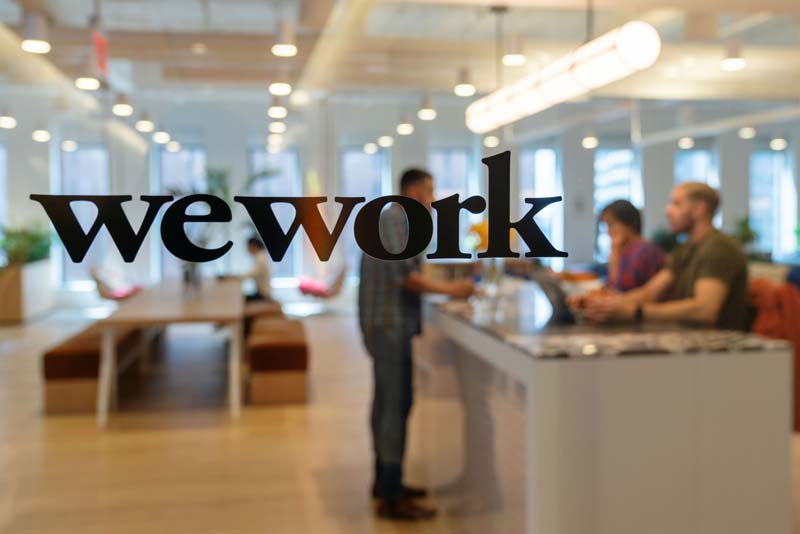 David 'Dee' Delgado for Bloomberg
David 'Dee' Delgado for Bloomberg
A.) Burn through that entire pile of cash while ...
B.) Yammering about running for "president of the world," before ...
C.) Attempting to bill the company $6 million for the use of the word "We" in its name and all the while ...
D.) Selling or borrowing against his own shares in the company to buy five mansions and a private jet?
If you're SoftBank, you throw billions more at WeWork, presumably hoping that a sudden torrent of cash will extinguish this monetary bonfire. Also, you pay the entrepreneur, Adam Neumann, more than $1 billion to stop tossing matches at your money and go away.
This might be the most spectacular implosion of a business in U.S. history. Other failures were bigger, in mere dollars. But WeWork has to be the most literally incredible. Profanity seems somehow inadequate. It's just ... holy wow.
In the end, SoftBank reportedly will have invested $18.5 billion in this disaster, more than the gross domestic product of Jamaica. Think about that: Instead of buying a co-working company with an astronomical burn rate, Masayoshi Son, the chief executive of SoftBank, and the sovereign wealth funds that invested with him could have had all the stuff produced in Jamaica for an entire year -- aluminum ore, coffee, rum.
They could have rented out every hotel room, restaurant and movie theater on the island just for themselves and their friends, and they could have frolicked up and down Dunn's River Falls like Tom Cruise and Elisabeth Shue in "Cocktail."
Instead, Son gave that money to Neumann to rent empty offices, buy a lot of plate glass and create what a WeWork tenant of my acquaintance called "a high-tech prison" with "concentric rectangles of fully transparent cells."
Co-working spaces can be profitable, mind you. But normal co-working landlords don't get valued at the extravagant revenue multiples Neumann asked for -- and got -- by redubbing his facilities a "physical social network."
The WeWork story is so utterly bizarre that people can't even get properly outraged about it. I mean, they're trying -- Sen. Tom Cotton, R-Ark., tweeted Wednesday night that "Neumann is a fraud & a good example of why some people support a socialist like @BernieSanders. He ought to be sued & investigated."
And sure, you'd think there must be an indictment in the offing somewhere. Neumann's self-dealing was so egregious that kleptocrats around the world are enviously scribbling notes.
But that's the magnificent insanity of all this: Neumann's predation was apparently legal. And it's not even clear it shouldn't be. After all, everyone who gave Neumann money was a rich, experienced investor who knowingly and voluntarily ceded managerial control to a spaced-out co-working guru. I'm not saying Neumann's behavior was admirable, except in a roguish anti-hero kind of way.
But is it the government's job to stop venture capitalists from climbing into a start-up's metaphorical back seat, handing over the keys and letting chief executives take them for a ride? After all, professional venture capitalists are generally going to be better able to assess the viability of a business model than judges or, for that matter, senators.
It does seem outrageous that Neumann got so much while WeWork's employees will get to keep their jobs only if they're lucky. But it's not like Neumann took that more than $1 billion payout from them. SoftBank gave him voting control over the company, which allowed him to essentially take WeWork hostage and demand a ransom. With a saner governance structure, Neumann couldn't have done this, and SoftBank could have kept the billion dollars; either way, no court was going to make them gift it to the suffering staff.
So maybe the indictment needed here should be aimed at capitalism, which enabled such an absurd and outrageous outcome. But the premise of capitalism was never that individual capitalists always make wise choices, only that when those capitalists do something egregiously stupid, markets will eventually make them stop. That's exactly what happened as soon as WeWork filed for an IPO.
Which might be the craziest thing of all about this story: The regulated public markets worked exactly as intended, protecting ordinary retail investors from the folly of the people who were supposed to know better. I wouldn't exactly call that a happy ending, but we probably can't expect a better one.
Sign up for the daily JWR update. It's free. Just click here.
(COMMENT, BELOW)
Megan McArdle is a Washington Post columnist who writes on economics, business and public policy. She is the author of "The Up Side of Down." McArdle previously wrote for Newsweek-the Daily Beast, Bloomberg View,the Atlantic and the Economist.


 Contact The Editor
Contact The Editor
 Articles By This Author
Articles By This Author